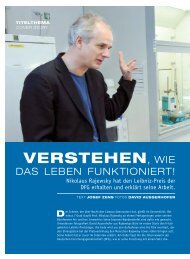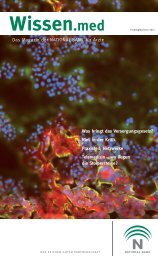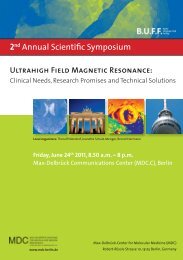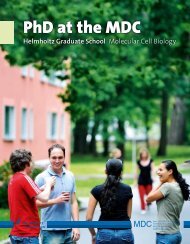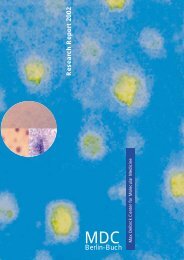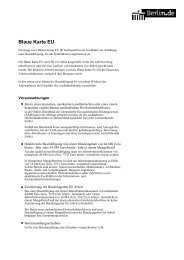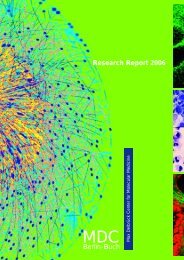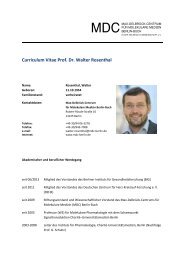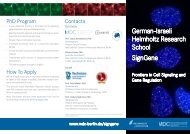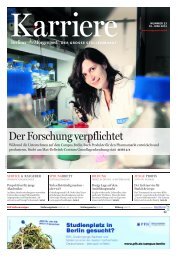Structure of the GroupDominik N. Müller(Delbrück Fellow)Group LeaderDr. Dominik N. MüllerScientistsDr. Petra GratzeDr. Heda KvakanDr. Verena FokuhlDr. Norbert HenkeDr. Fatimunnisa QadriAssociated ScientistsDr. Ralf DechendDr. Wolf-Hagen SchunckDr. Robert FischerGraduate StudentsUlrike MaschkeAnne KonkelTechnical AssistantsMay-Britt KöhlerJutta MeiselGabi N’diayeJuliane AndersManager of sponsored programsSusanne WisslerMechanisms of Hypertension-InducedTarget Organ DamageDominik N. Müller leads a group of young investigators pursuing the question of how hypertensioninduces target-organ damage. In a translational approach funded by an ECRC grant, Ralf Dechend(Helios Clinic) and Dominik Müller focus primarily on the placenta, heart and kidneys. The primarymediator that has captured their attention is the renin-angiotensin system. The group also cooperatesclosely with <strong>MDC</strong> scientists. The group has also been a resource for young clinicians and doctoralstudents beginning their careers in experimental cardiovascular research.The group collaborated with Michael Bader and OliverDaumke on the (pro)renin receptor, with Wolf-HagenSchunck and Robert Fischer (Charité) on target organprotective role of polyunsaturated fatty acid and theidentification eicosanoid receptors, with Ruth Schmidt-Ullrich and Claus Scheidereich on the role of NF-κB intarget organ damage, with Martin Zenke (Aachen) toexplore the role of the “inhibitor of differentiation 2”(ID2) in hypertension-induced kidney injury, and withMarkus Kleinewietfeld to elucidate the protective role ofregulatory T cells (Tregs) in hypertension-induced cardiacinjury. Finally, the group made the novel observationthat the human renin promulgates obesity in transgenicrats by inducing changes in energy metabolism.Immune mechanisms in hypertensionMice deficient for Id2(-/-) lack Langerhans and splenicCD8a+ dendritic cells, have reduced natural killer cells,and have altered CD8 T-cell memory. Petra Gratze andthe group tested the hypothesis that an alteration inthe number and quality of circulating blood cellscaused by Id2 deletion would ameliorate angiotensin(Ang) II-induced target-organ damage. Id2-/- micefailed to develop an increase in blood pressure wheninfused with Ang II and had no target-organ damage.The group conducted kidney (figure 1) and bone marrowtransplants that did not restore the sensitivity toAng II. They also found that vascular smooth musclecells from Id2-/- mice showed an antisenescence phenotype.The study identified a previously undefined rolefor Id2 in the pathogenesis of Ang II-induced hypertension.This role is being further explored.Heda Kvakan led the project studying the role ofimmunosuppressive CD4+CD25+ regulatory T (Treg)cells in the pathogenesis of hypertensive target organdamage. The group conducted adoptive transfer of Tregcells into Ang II-infused hypertensive mice. Treg cellrecipients exhibited improved cardiac hypertrophy andless cardiac fibrosis despite sustained hypertension.Amelioration of cardiac morphology was accompaniedby an improvement in arrhythmogenic electric remodeling,indicating the functional significance of theenhanced cardiac morphology. Pronounced connexin43 immunoreactivity was found at the lateral bordersof cardiomyocytes in Ang II-treated mice, implicatingthis gap-junction protein in the arrhythmias. In contrast,connexin 43 was restricted to the intercalateddisk regions in sham controls. Surprisingly, Ang II+Tregtreatedmice showed normal connexin 43 gap junctionprotein localization. Thus, Treg cells ameliorated cardiacdamage and accounted for the improved electricremodeling independently of blood pressure-loweringeffects. The results provide new insights into the pathogenesisof hypertensive cardiac damage and couldtherefore lead to new therapeutic approaches thatinvolve manipulation of the immune system.The (pro)renin receptorThe Müller laboratory collaborates with GenevieveNguyen (INSERM Paris), Michael Bader and Oliver36 Cardiovascular and Metabolic Disease <strong>Research</strong>
Daumke (both <strong>MDC</strong>) on studying the (pro)renin receptor,a transmembrane protein that binds either renin orprorenin. Prorenin is activated by this binding to allowthe cleavage of angiotensinogen to Ang I (and then toAng II through the angiotensin converting enzyme).Independent of that process, the (pro)renin receptoralso signals via extracellular-regulated kinase (ERK1/2)and can activate the transforming growth factor (TGF)pathway. Others claim that by blocking the (pro)reninreceptor, by means of a decoy peptide sequence termedthe handle-region peptide (HRP), the vascular damagecaused by diabetes mellitus can be completely ameliorated.The Müller laboratory has worked intensively onthis important problem. Sandra Feldt was primarilyresponsible for this project. The group tested whetherhuman prorenin and renin induce ERK1/2 activationand whether the direct renin inhibitor aliskiren or theHRP inhibits the receptor. The (pro)renin receptormRNA and protein was detected in isolated humanmonocytes and in U937 monocytes. In U937 cells, thegroup found that both human renin and prorenininduced a long-lasting ERK1/2 phosphorylation despiteAng II type 1 and 2 receptor blockade. A mitogen-activatedprotein kinase kinase 1/2 inhibitor inhibited bothrenin and prorenin-induced ERK 1/2 phosphorylation.Neither aliskiren nor HRP inhibited binding of (125)Ireninor (125)I-prorenin to the (pro)renin receptor.Fluorescence-activated cell sorter analysis showed that,although fluorescein isothiocyanate-labeled HRPbound to U937 cells, HRP did not inhibit renin orprorenin-induced ERK1/2 activation. Thus, prorenin andrenin-induced ERK 1/2 activation are independent ofAng II. The signal transduction is different from thatevoked by Ang II. Aliskiren has no (pro)renin receptorblocking effect and did not inhibit ERK1/2 phosphorylationor kinase activity. There was no evidence that HRPaffects renin or prorenin binding and signaling. TheCouncil for High Blood Pressure <strong>Research</strong> of theAmerican Heart Association voted this work as the“best basic paper of the year”, published in the journalHypertension.Renin and metabolismRenin initiates Ang II formation and (aside from the(pro)renin receptor) has no other known functions.Petra Gratze and the Muller group observed that transgenicrats (TGR) overexpressing the human renin gene(hREN) developed moderate obesity with increasedbody fat mass and glucose intolerance compared withnontransgenic Sprague-Dawley (SD) rats. The metabolicchanges were not reversed by an angiotensin-convertingenzyme inhibitor, a direct renin inhibitor, or by(pro)renin receptor blocker treatment. The obese phenotypein TGR(hREN) originated from higher foodintake, which was partly compensated by increases inRenal Id2 deficiency does not the genesis of hypertension andrenal damage.resting energy expenditure, total thermogenesis (postprandialand exercise activity), and lipid oxidation duringthe first 8 weeks of life. Once established, the differencein body weight between TGR(hREN) and SD ratsremained constant over time. The group observed nochanges in the cocaine and amphetamine-regulatedtranscript, pro-opiomelanocortin, both anorexigenic, orneuropeptide Y, orexigenic, mRNA levels in TGR(hREN)versus SD controls. However, the mRNA level of theagouti-related peptide, orexigenic, was significantlyreduced in TGR(hREN) versus SD controls at the end ofthe study, which indicates a compensatory mechanism.The group suggested that the human renin transgeneinitiates a process leading to increased and earlyappetite, obesity, and metabolic changes not related toAng II. The mechanisms are independent of any currentlyknown renin-related effects. The novelty here is theintroduction of renin as an obesity-related enzyme. Thegroup is busy exploring mechanisms further.Selected PublicationsGratze, P, Dechend, R, Stocker, C, Park, J-K, Feldt, S, Shagdarsuren, E, Wellner,M, Gueler, F, Rong, S, Gross, V, Obst, M, Plehm, R, Alenina, N, Zenclussen, A,Titze, J, Small, K, Yokota, Y, Zenke, M, Luft, FC, Muller, DN. (2008) Novel rolefor inhibitor of differentiation 2 in the genesis of angiotensin II-inducedhypertension. Circulation. 117, 2645-2656.Kvakan, H, Kleinewietfeld, M, Qadri, F, Park, JK, Fischer, R, Schwarz, I, Rahn,HP, Plehm, R, Wellner, M, Elitok, S, Gratze, P, Dechend, R, Luft, FC, Muller, DN.(2009) Regulatory T cells ameliorate angiotensin II-induced cardiacdamage. Circulation. 119, 2904-2912Feldt, S, Maschke, U, Dechend, R, Luft, FC, Muller, DN. (2008) The putative(pro)renin receptor blocker HRP fails to prevent (pro)renin signaling. J AmSoc Nephrol. 19, 743-748.Feldt, S, Batenburg, WW, Mazak, I, Maschke, U, Wellner, M, Kvakan, H,Dechend, R, Fiebeler, A, Burckle, C, Contrepas, A, Danser, JAH, Bader, M,Nguyen, G, Luft, FC, Muller, DN. (2008) Prorenin and renin-inducedextracellular signal-regulated kinase 1/2 activation in monocytes is notblocked by aliskiren or the handle-region peptide. Hypertension. 51,682-688.Gratze, P, Boschmann, M, Dechend, R, Qadri, F, Malchow, J, Graeske, S, Engeli,S, Janke, J, Springer, J, Contrepas, A, Plehm, R, Klaus, S, Nguyen, G, Luft, FC,Muller, DN. (2009) Energy metabolism in human renin-gene transgenicrats: does renin contribute to obesity? Hypertension. 53, 516-523.Cardiovascular and Metabolic Disease <strong>Research</strong> 37
- Page 1:
Research Report 2010MAX DELBRÜCK C
- Page 4 and 5:
ContentInhaltContentInhalt.........
- Page 6 and 7:
Surgical OncologyPeter M. Schlag...
- Page 11 and 12: at the MDC. The role of the institu
- Page 13 and 14: in discovering genes that contribut
- Page 16 and 17: The ECRC offers research space and
- Page 18 and 19: etween disciplines such as biology,
- Page 20 and 21: approaches from bioinformatics/syst
- Page 23 and 24: von Humboldt Foundation (AvH). The
- Page 25: organization to a larger, multi-fac
- Page 28 and 29: Cardiovascular and Metabolic Diseas
- Page 30 and 31: electrical signals. More recent wor
- Page 32 and 33: Basic Cardiovascular FunctionStruct
- Page 34 and 35: Figure 2: SORLA and sortilin in neu
- Page 36 and 37: Annette Hammes(Delbrück Fellow)Str
- Page 38 and 39: Ingo L. MoranoStructure of the Grou
- Page 40 and 41: Figure 3. Membrane resealing assay
- Page 42 and 43: Michael GotthardtStructure of the G
- Page 44 and 45: Structure of the GroupSalim Seyfrie
- Page 46 and 47: Structure of the GroupFerdinand le
- Page 48 and 49: Francesca M. SpagnoliStructure of t
- Page 50 and 51: Structure of the GroupKai M. Schmid
- Page 52 and 53: Genetics and Pathophysiology of Car
- Page 54 and 55: Figure 2. Planariato experimentally
- Page 56 and 57: Norbert HübnerStructure of the Gro
- Page 58 and 59: Structure of the GroupGroup LeaderF
- Page 60 and 61: Figure 2. Omega-3 fatty acids prote
- Page 64 and 65: Rainer DietzStructure of the GroupG
- Page 66 and 67: Figure 2. Cardiac-restricted ablati
- Page 68 and 69: Ludwig ThierfelderStructure of the
- Page 70 and 71: standing of the molecular and cellu
- Page 72 and 73: Structure of the GroupThoralf Niend
- Page 74 and 75: Michael BaderStructure of the Group
- Page 76 and 77: Natriuretic peptide systemJens Butt
- Page 78 and 79: Structure of the GroupZsuzsanna Izs
- Page 80 and 81: Young-Ae LeeStructure of the GroupG
- Page 82 and 83: Structure of the GroupMatthias Selb
- Page 84 and 85: Matthew PoyStructure of the GroupGr
- Page 86 and 87: Jana WolfStructure of the GroupGrou
- Page 88 and 89: Structure of the GroupGroup LeaderD
- Page 91 and 92: Cancer Research ProgramKrebsforschu
- Page 93 and 94: are responsible for the emergence o
- Page 95 and 96: tral component of the canonical Wnt
- Page 97 and 98: lead to an aberrant constitutive ac
- Page 99 and 100: How Notch- and TGFβ signaling casc
- Page 101 and 102: tures of the chronic phase in human
- Page 103 and 104: oped a new safeguard that is based
- Page 105 and 106: Graduate StudentsSeda Cöl ArslanCa
- Page 107 and 108: investigation, as is the cause of c
- Page 109 and 110: Graduate StudentsÖzlem Akilli Özt
- Page 111 and 112: onment, the (cancer) stem cell nich
- Page 113 and 114:
The pluripotent state of murine and
- Page 115 and 116:
In the morula of the early mouse em
- Page 117 and 118:
Graduate StudentsRami Hamscho*Qingb
- Page 119 and 120:
esis and granulopoiesis. We showed
- Page 121 and 122:
URE ∆/∆ mice regularly develope
- Page 123 and 124:
PD Dr. Wolfgang Walther (GroupLeade
- Page 125 and 126:
For the delivery of naked DNA into
- Page 127 and 128:
ACBDMyc and FoxO transcription fact
- Page 129 and 130:
Graduate StudentsKatrin BagolaHolge
- Page 131 and 132:
Heinemann, we could also identify t
- Page 133 and 134:
Above: Tip of chromosom3L showing t
- Page 135 and 136:
Graduate StudentsSarbani Bhattachar
- Page 137 and 138:
vesicle transport to the Golgi. Our
- Page 139 and 140:
acbFigure 1a: EHD2 is tubulatingpho
- Page 141 and 142:
KnowledgeProbabilitiesknownPossible
- Page 143 and 144:
Graduate and undergraduatestudentsU
- Page 145 and 146:
successive oncogenic mutations. We
- Page 147 and 148:
CXCR5 drives the development of ect
- Page 149 and 150:
Graduate and undergraduatestudentsW
- Page 151 and 152:
Graduate andUndergraduate StudentsM
- Page 153 and 154:
Angela MensenStefanie WittstockBjö
- Page 155 and 156:
deficient mice, both major effector
- Page 157 and 158:
ant of CD3 delta coding for a 45-me
- Page 159 and 160:
Robert KudernatschLi-Min LiuAna Mil
- Page 161 and 162:
Sebastian GüntherTechnical Assista
- Page 163 and 164:
Graduate StudentsJana RolffAnnika W
- Page 165:
with murine hepatocytes showed morp
- Page 168 and 169:
Function and Dysfunction of the Ner
- Page 170 and 171:
The Neuroscience Department also es
- Page 172 and 173:
the coming years, Björn Schröder
- Page 174 and 175:
mice. Further analysis of the funct
- Page 176 and 177:
Signaling Pathways and Mechanisms i
- Page 178 and 179:
Control Olig3 -/-ABFigure 2. Geneti
- Page 180 and 181:
Thomas J. JentschStructure of the G
- Page 182 and 183:
Figure 2. Cellular model for ionic
- Page 184 and 185:
Structure of the GroupGroup LeaderF
- Page 186 and 187:
paired-pulse facilitation, less dep
- Page 188 and 189:
Gary R. LewinStructure of the Group
- Page 190 and 191:
Model summarizing the three waves o
- Page 192 and 193:
Structure of the GroupInes Ibañez-
- Page 194 and 195:
Jochen C. MeierStructure of the Gro
- Page 196 and 197:
Björn Christian SchroederStructure
- Page 198 and 199:
Structure of the GroupJan Siemens(S
- Page 200 and 201:
Structure of the GroupGroup LeaderD
- Page 202 and 203:
Imaging of the Living BrainStructur
- Page 204 and 205:
Pathophysiological Mechanisms of Ne
- Page 206 and 207:
Figure 2. Iba1 positive microglia c
- Page 208 and 209:
Erich E. WankerStructure of the Gro
- Page 210 and 211:
Scientific-Technical StaffAnja Frit
- Page 212 and 213:
Structure of the GroupJan Bieschke(
- Page 215 and 216:
Berlin Institute of Medical Systems
- Page 217 and 218:
etes, metabolic diseases and neurod
- Page 219 and 220:
A number of MDC investigators have
- Page 221 and 222:
Technical AssistantsClaudia Langnic
- Page 223 and 224:
has become a standardized data flow
- Page 225:
Phylogeny of cellulase genes from P
- Page 228 and 229:
Experimental and Clinical Research
- Page 230 and 231:
his patients, and a basic research
- Page 232 and 233:
The ultrahigh field MR facility was
- Page 234 and 235:
Structure of the GroupSimone Spuler
- Page 236 and 237:
Ralph KettritzStructure of the Grou
- Page 238 and 239:
Structure of the GroupJeanette Schu
- Page 240 and 241:
Maik GollaschStructure of the Group
- Page 243 and 244:
Technology PlatformsComputational B
- Page 245 and 246:
projects/ard/] to detect repeats li
- Page 247 and 248:
Simulation of line-scan images of C
- Page 249 and 250:
Development of an MRM method for qu
- Page 251 and 252:
mobility or turnover of the underly
- Page 253 and 254:
Left: Inside view of a FACSAria2 (f
- Page 255 and 256:
Examples fort the use of EM methods
- Page 257:
Oviducts lined up in pre-implantati
- Page 260 and 261:
Academic Appointments 2008-2009Beru
- Page 262 and 263:
Buch which is part of the Excellenc
- Page 264 and 265:
“Bioinformatics in Quantitative B
- Page 266 and 267:
Delbrück FellowsDelbrück-Stipendi
- Page 268 and 269:
Yinth Andrea Bernal-Sierra, a PhD s
- Page 270 and 271:
Congresses and Scientific MeetingsK
- Page 272 and 273:
SeminarsSeminare2008Speaker Institu
- Page 274 and 275:
Speaker Institute TitleKiyoshi Mori
- Page 276 and 277:
2009Speaker Institute TitleDavid G.
- Page 278 and 279:
Speaker Institute TitleJuri Rappsil
- Page 280 and 281:
The Helmholtz AssociationDie Helmho
- Page 282 and 283:
The Berlin-Buch CampusDer Campus Be
- Page 284:
the MDC, the existing collaboration
- Page 287 and 288:
Prof. Dr. Gary R. LewinMDC Berlin-B
- Page 289 and 290:
Prof. Dr. Renato ParoCenter of Bios
- Page 291 and 292:
Staff CouncilThe Staff Council is i
- Page 293 and 294:
Type of Financing/Art der Finanzier
- Page 295 and 296:
Research Projects 2008-2009Forschun
- Page 297 and 298:
CIC-5 Regulation und Endocytose am
- Page 299 and 300:
MDCMAX-DELBRÜCK-CENTRUMFÜR MOLEKU
- Page 301 and 302:
Index 275Bröske, A. . . . . . . .
- Page 303 and 304:
Index 277Gross, V. . . . . . . . .
- Page 305 and 306:
Index 279Kur, E. . . . . . . . . .
- Page 307 and 308:
Index 281Piano, F. . . . . . . . .
- Page 309 and 310:
Index 283Smink, J. . . . . . . . .
- Page 312 and 313:
Campus MapCampusplanRobert-Rössle-
- Page 314:
How to find your way to the MDCDer



